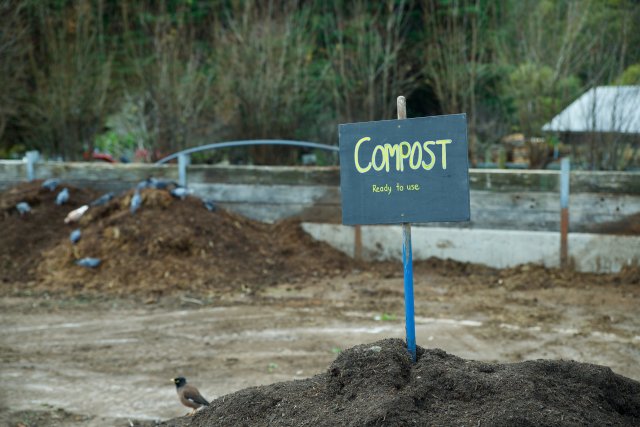Start a Composting Program
Interested in establishing or expanding a composting program in your area? Here are a few things to consider and some helpful resources to get started!
On this page:
Considerations for Starting a Composting Program

- What composting and collection services already exist in your area? Is there any community composting? Does your municipality or county have a yard waste composting site? Are there places to drop off food scraps? Are any existing composting or collection programs interested in expanding?
- Who are your potential partners or supporters? Consider who might be interested in using compost or a composting service, championing its use, or educating others. This could include:
- Local government officials and solid waste managers.
- Local farms and community gardens.
- Local businesses.
- Residents.
- Community-based organizations.
- Schools.
- University cooperative extension services.
- Where could composting take place? What do zoning ordinances allow for? What state regulations (i.e., permitting requirements) apply to your situation? This often depends on the size of a composting site and what types of materials are accepted. What partners/supporters may have space for composting on their sites? This includes:
- Municipality- or county-owned land.
- Local farms or community gardens.
- Schools.
- Other institutions.
- Community-based organizations.

- How will the composting program be run and be supported in the long-term? Will it be for-profit, non-profit, municipal-run, a public-private partnership or something else? Where will initial funding come from and how will funding be sustained? What’s the available budget? Who has composting training or expertise and can ensure best practices are followed? Who will do the actual work of collecting and composting organic materials? What types of materials will be accepted and where will they come from? How will participants learn about the composting program? Is there a market for compost or will you need to develop one?
- What successful composting programs can you learn from? Check your local area and beyond. Look for programs that are operating under similar conditions to yours. These conditions include rural or urban service area, materials accepted, organizational or funding structure, site location, and so forth. There are great models out there – no need to reinvent the wheel!
Once you answer the above questions, check out the additional resources below.
Resources
EPA Resources
- Approaches to Composting – learn about different models and methods of composting, as well as some basic composting science.
- Benefits of Using Compost – learn about the environmental benefits of using compost for soil health, stormwater management, site remediation and more.
- Community Composting – learn more about this decentralized model of composting and find more resources.
- Composting at Home – learn about different ways to start composting at home.
- Composting Homepage – learn about the benefits of composting organic materials, plus find resources on composting policy and legislation.
- EPA Composting Food Scraps in Your Community: A Social Marketing Toolkit.
- Model Recycling Toolkit.
- Managing and Transforming Waste Streams: A Tool for Communities.
Other Resources
- Target Organics – A Compost Program Resources Hub (U.S. Composting Council).
- Toolkit for Adding Food Waste to a Yard Trimmings Compost Facility (pdf) (8.4 MB) (Center for EcoTechnology and BioCycle).
- Best Management Practices for Incorporating Food Residuals into Existing Yard Waste Composting Operation (pdf) (2.8 MB) (U.S. Composting Council).
- Curb to Compost Toolkit (Compost Research and Education Foundation).
- On-Farm Composting Toolkit (Composting Association of Vermont).
- Community Composting Done Right: A Guide to Best Management Practices (Institute for Local Self-Reliance).
- Compost Facility Planning Series (BioCycle).
- The Composting Handbook.
- A Blueprint for Scaling Collection and Composting Infrastructure (pdf) (22.7 MB) (Composting Consortium).
- Colorado Organics Infrastructure Toolkit (Colorado Department of Public Health & Environment).
